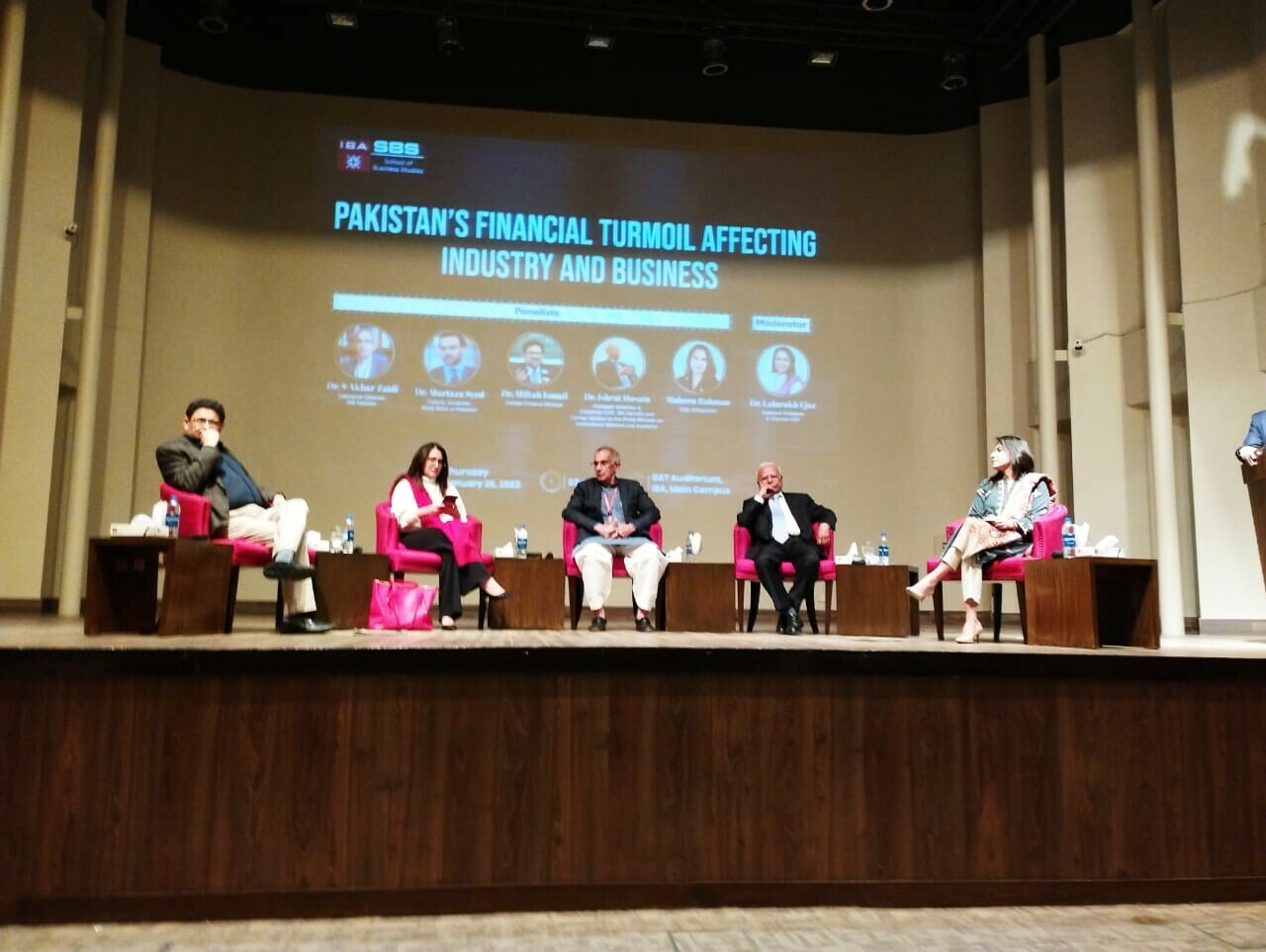Keeping dollar in narrow range was insanity, says Dr Miftah Ismail at IBA event
- Former finance minister says black market cannot be stopped by administrative measures
Former finance minister Dr Miftah Ismail on Thursday termed it insane to keep the dollar rate in a narrow range, and congratulated the government for “letting go of the lid on the exchange rate” that resulted in the the rupee settling with a loss of 9.6% in a single session.
As per the State Bank of Pakistan (SBP), the rupee closed at 255.43 against the US dollar, a depreciation of 9.61% or Rs24.54 on Thursday. This was the largest one-day drop in history in absolute terms.
“The depreciation will have a minimal impact on inflation. Importers have already factored in the dollar rate at around Rs260,” said Miftah during a panel discussion on ‘Pakistan’s Financial Turmoil Affecting Industry and Business’ organised by the Institute of Business Administration (IBA), Karachi.
The event was moderated by Dr Lalarukh Ejaz, Director of the Centre for Entrepreneurial Development at IBA Karachi.
“Those who have studied economics, or have a little know how, know that it is insane to do something like this (to restrict dollar rate at a certain level),” he said.
“The market finds its way just like water. Dollar rate will also find its market value, which it actually did in the black market.”
Miftah said the black market cannot be stopped by administrative measures.
According to him, there was no need to control the dollar rate.
“To help the struggling segment of the society, there should be social programmes, which the International Monetary Fund (IMF) doesn’t deny for poor segments,” he said. “Reforms don’t always mean increasing prices.”
He stressed that Pakistan should ink an agreement with the IMF immediately and rationalise the dollar rate.
“We have a very inefficient economy and we have to turn it competitive,” he said.
For instance, he said, that there are five airlines in the country with each offering similar ticket prices and services.
“Private airlines are making profits, paying 35% in taxes while PIA is incurring a Rs90-billion loss. We should privatise loss-making entities to make our economy efficient. We have to do it somewhere down the line,” he underlined.
Speaking on the occasion, IBA Executive Director Dr Akbar Zaidi said that there was immense uncertainty in the economy.
“We don’t know what’s going to happen the next morning,” he said.
He said countries in the IMF programme usually don’t default. “But the question is whether we are in the programme or not,” he said.
He was of the view that Pakistan will not default.
Miftah, however, said the IMF is not an insurance against default.
“It is a lender of the last resort,” he said.
Meanwhile, former State Bank of Pakistan governor Ishrat Husain said Pakistan’s current problems had been in the making for a long time.
He recalled that in 1970, Zulfikar Ali Bhutto nationalised many companies that forced countless entrepreneurs to leave the country.
“The technical expertise also went away with them. Bureaucrats were told to look after the manufacturing sector, which they didn’t know about. This is where it (the downward spiral) all started.”
He said that Pakistan doesn’t invest in manufacturing facilities.
“The manufacturing sector is over-taxed, which has taken away its enticement as it pays around 63% of the total taxes,” he said.
He added that the informal sector makes an immense amount of money while the formal sector is over-regulated.
InfraZamin Pakistan CEO Maheen Rahman said that this is not the first time that Pakistan has been in a crisis situation.
“We have been in the IMF program for 45 years.
“Let’s break the imports and exports down. Energy is Pakistan’s Achilles heel. If we work on renewable energy, we can reduce half of our energy imports,” she said.
“We don’t have a viable renewable energy policy. We have the ability to deal with this. It’s on policy makers. Give a long-term policy, it should be brought into the mainstream conversation.”
She added that Pakistan imports a lot of food items including wheat and palm oil.
Rahman said research and direction can help Pakistan easily reduce imports of these things too.
“We have the ability to reduce the biggest imports. There is a need for a long-term policy.”
She said that Pakistan is the only country with the equation that remittances and exports are somewhat similar as 220 million people living here can export only as much as less than 10 million overseas Pakistanis send as remittances.
Policy rate
In response to a query, Zaidi said that he doesn’t agree with the view that interest rates help deal with inflation in a country.
“This doesn’t stand for a country like Pakistan where financial inclusion is very low. Financial inclusion is lower than India and Bangladesh. I don’t think by raising interest rates you can reduce inflation. You are doing more damage than good to the economy by raising interest rates,” he said.
However, Miftah disagreed with Zaidi and said that the State Bank has limited tools to fix inflation.
“It (raising interest rates) reduces a bit of money supply. Therefore, it reduces a bit of inflation.”





















Comments
Comments are closed.